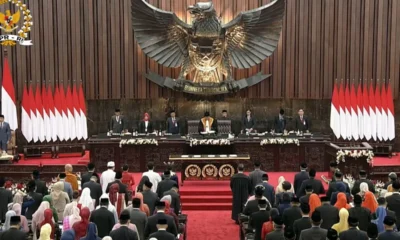Africa
Reflections On The Day “Agege Bread” Became A Football And The Day Obasa Lost His Crown: How Time Flies!, by Isaac Asabor

In the annals of Nigeria’s socio-political history, few images capture the absurd juxtaposition of power, privilege, and poverty as vividly as the day “Agege bread” became a football in the hands of disillusioned youths. It was a day that laid bare the deep disconnect between the ruling elite and the governed, a poignant symbol of how far we have strayed from governance rooted in empathy and service. As we now muse on the recent political fall of Mudashiru Obasa, former Speaker of the Lagos State House of Assembly, one cannot help but reflect on the fleeting nature of power and the lessons that remain unlearned.
Aptly put, it was a day when hunger met insult. It was during one of those predictable waves of “palliatives”, a term that has since become synonymous with tokenism in Nigerian governance. The youths in Agege, like many others across Lagos and the nation, had been battered by an economy that offered little respite. Inflation was at an all-time high, unemployment soared, and basic necessities became luxuries for many. Against this backdrop, the state government, represented by Obasa and his political allies, thought it prudent to distribute Agege bread as a “palliative.”
But the youths were not having it. To them, the offering was not just insufficient but insulting. A loaf of bread could hardly address the systemic rot that had eroded their opportunities and dignity. In a moment of collective catharsis, they turned the bread into a football, kicking it around the streets of Agege in an act that was equal parts protest and parody.
The scene was surreal. Onlookers cheered as the bread soared through the air, landing with a dull thud on dusty streets. The message was clear: this is what we think of your “palliatives.” It was a moment of defiance that captured the frustrations of a generation that had grown tired of empty promises and superficial gestures.
Fast forward to the present, and the political tide has turned against Obasa. Once a towering figure in Lagos politics, wielding significant influence as Speaker of the State House of Assembly, he now finds himself impeached and stripped of power. Accusations of financial mismanagement, corruption, and abuse of office had long dogged his tenure, but for years, he seemed untouchable. The irony is palpable: a man who once sought to placate the masses with bread has now been cast out by the very system that upheld him.
Obasa’s impeachment is a stark reminder of how time flies and fortunes change. In Nigerian politics, where impunity often reigns supreme, the fall of a high-profile figure like Obasa is a rarity. Yet, it serves as a potent illustration of the transient nature of power and the enduring demand for accountability, even in a system as flawed as ours.
Whether this piece is misunderstood or not, there are lessons from the bread ball game as the Agege bread incident was more than just a momentary spectacle; it was a metaphor for the broader failures of leadership in Nigeria. It highlighted the disconnect between the governed and their leaders, who often operate in echo chambers insulated from the realities of the average Nigerian.
Leaders like Obasa, who saw palliatives as mere acts of charity rather than rights owed to citizens, missed the point entirely. Governance is not about dispensing crumbs to the masses while hoarding the loaf; it is about creating systems that ensure everyone has access to their fair share. The bread ball game was a visceral rejection of a governance model that thrives on tokenism and condescension.
How Time Flies! Time, as they say, waits for no one. The same youths who kicked around those loaves of bread are now older, wiser, and perhaps even more disillusioned. For them, the impeachment of Obasa may feel like a small victory, a glimmer of justice in a landscape where accountability is scarce. Yet, it also serves as a sobering reminder of how much remains unchanged. The systemic issues that led to that moment of protest persist, and the cycle of poor governance continues unabated.
For Obasa, the fall from grace is undoubtedly humbling. But for the rest of us, it is a moment to reflect on the fleeting nature of power and the importance of using it wisely. Leaders come and go, but the impact of their actions, or inactions, can linger for generations. The question is: what legacy will they leave behind?
Looking at this issue from the perspective of the role of the youth, it is germane to opine that if there is one takeaway from both the bread ball game and Obasa’s impeachment, it is the power of the youth. Despite being marginalized and underestimated, they have consistently shown their ability to challenge the status quo. Whether through protests, social media campaigns, or symbolic acts like turning bread into a football, the youth have proven that they are not a passive demographic to be placated with crumbs.
However, their power needs to be harnessed strategically. Symbolic acts of protest are important, but they must be complemented by sustained efforts to demand accountability and drive systemic change. The same energy that turned Agege bread into a symbol of defiance must now be directed toward building a Nigeria where such acts are no longer necessary.
At this juncture, it is expedient to ask in this context, “What next for Nigerian Leadership?” The answer to the foregoing question cannot be farfetched as Obasa’s impeachment should serve as a wake-up call for other leaders who have grown complacent in their positions. The era of impunity is gradually being challenged, and the Nigerian people are becoming more vocal in their demands for good governance. Leaders must recognize that their actions have consequences, and the days of governing without accountability are numbered.
For the citizens, the lesson is clear: vigilance and persistence are key. The fall of one politician is not enough to change the system; it is merely a step in the right direction. The fight for a better Nigeria requires collective effort, sustained advocacy, and a commitment to holding leaders accountable at all levels.
As a closing thought, it is germane to opine that as we reflect on the journey from the bread ball game to Obasa’s impeachment, we are reminded of the fleeting nature of time and the enduring power of collective action. The youths who played football with Agege bread sent a message that resonated far beyond the streets of Lagos. Today, that message remains as relevant as ever: Nigerians deserve better.
How time flies indeed. Yet, the question remains: will we use the lessons of the past to shape a better future, or will we continue to repeat the mistakes that brought us here? The choice, as always, is ours to make.




























